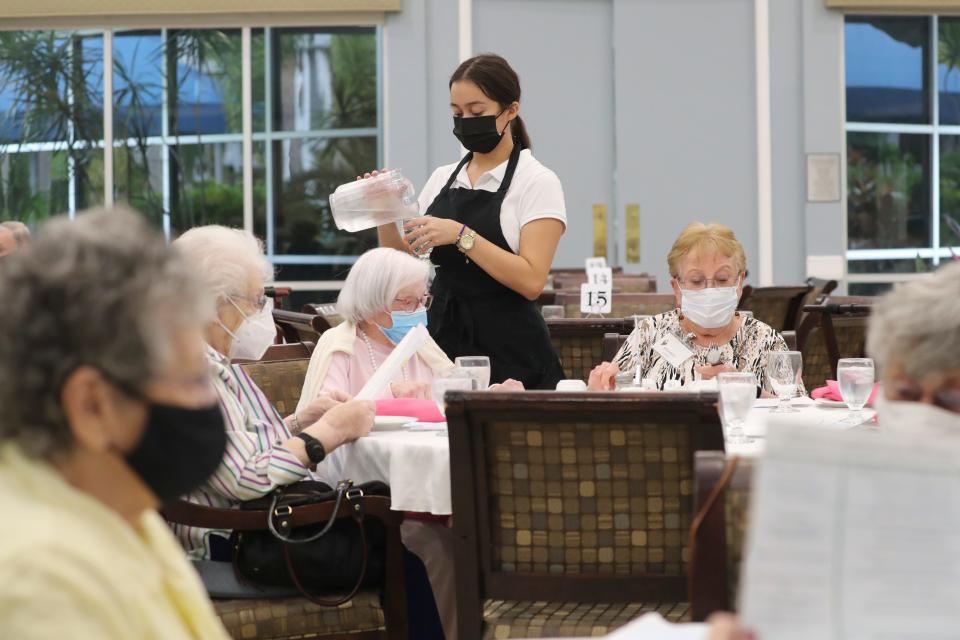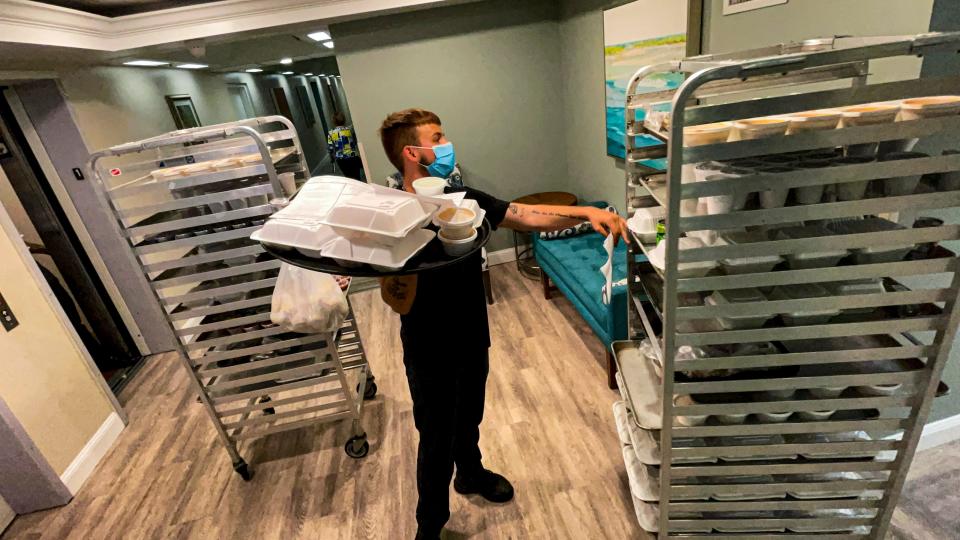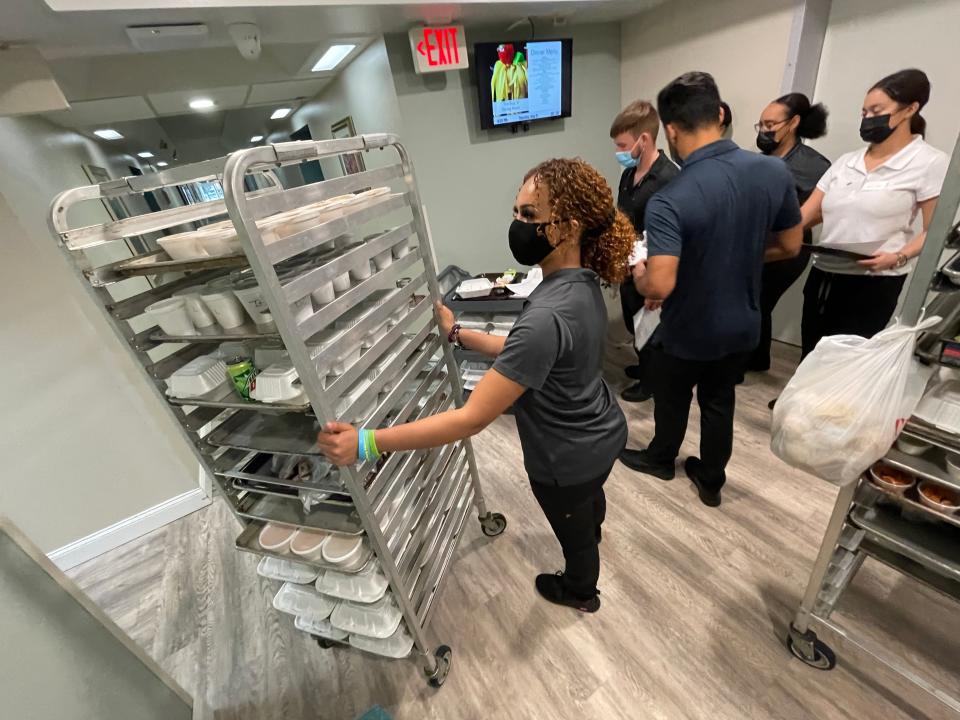Labor shortage puts strain on Sarasota health care providers
There’s a white tablecloth dinner every night of the week at Aviva Senior Living in Sarasota.
At dinnertime in the Sarasota the retirement community at 17th Street and Honore Avenue, there’s gourmet food, a professional wait staff and a dress code, meant to remind seniors in independent living of the days of formal suppers. It’s something residents look forward to, CEO Jay Solomon said – it’s an important social time of the day.
But as the local, state and national labor markets have tightened, and hiring waitstaff has become increasingly problematic for employers, offering that experience has become ever more difficult. Because of a shortage of labor, Aviva decided to close the dining room temporarily and serve people in their rooms instead as of Sept. 1.

The labor issue at the retirement community runs much deeper than just waitstaff, however. It’s also been hard to find administrative workers, cooks, housekeepers and, most of all, nurses, Solomon said. The health care worker shortage is such a problem that even hiring temporary travel nurses through third-party agencies isn’t working, because no one is applying there either.
“This is the worst labor market that I’ve seen in the 37 years that I’ve been in health care,” Solomon said. “We have gone through a nursing shortage every 10 years, but to see a labor shortage across every department – that’s a first.”
Labor pains: Sarasota-Manatee bar and restaurant owners struggle to hire as things return to 'normal'
Jobs news: Sarasota County schools dealing with 'perfect storm' of staffing shortage
As a shortage of workers persists across most sectors in the U.S. economy, the health care industry in particular is in a state of crisis, especially as COVID-19 cases have surged once again. Hospitals, health care systems and nursing homes like Aviva are struggling to hire workers, and those who are employed are facing serious threats of burnout.
“For nurses, it’s really a patient safety issue as well as a work environment issue,” Willa Fuller, executive director of the Orlando-based Florida Nurses Association, said. “Nobody wants to be overworked, and if you have to be overworked and also have someone’s life in your hands, the stressors are amazing.”

Market forces
The U.S. is experiencing is a shortage of supplies, and labor is just one part of that, Chris Jones, an economist at the University of South Florida, said. Factory shutdowns because of COVID-19, petroleum shortages caused by the Texas winter storms and people losing work because of illness have led to demand for materials and services that just can’t be met.
It’s the opposite of what happened during the Great Recession, Jones said. Then, there was little demand for things like new furniture and homes. Jones said he thinks the federal stimulus checks issued in waves since the start of the pandemic exacerbated the problem.
“If you’re giving people the ability to spend money that they otherwise wouldn’t have but then suppliers don’t have the capacity to produce the products that there wouldn’t be demand for in the absence of stimulus packages, you get what you have today,” he said.
In any high-risk job, the reward has to be equally as high, Jones said. Steel workers on high-rise buildings dozens of stories high, for example, get compensated accordingly. It’s the same thing with health care workers, Jones said. They have to know they’re going to be compensated fairly to accept a large risk.
The problem is, wages haven’t risen across the board.
“What you have because of the pandemic is that level of risk has increased, almost exploded, to the level of someone working on an I-beam 70 stories up. But the pay hasn’t really changed at the end of the day,” he said. “The workload plus the increased risk, without a proportional degree of compensation to account for that, has made many individuals in the health care sector saying, ‘How much longer can I do this?’”
Sarasota Memorial Health Care System has been dealing with another surge of COVID-19 patients as the delta variant spreads. Spokeswoman Kim Savage said that the health care system, which employs 7,400, had 1,050 jobs posted as of late August, and is dealing with shortages of clinicians and nurses.
One of the big problems for SMH, Savage said, is the health care system has to compete with recruitment firms that offer large bonuses for traveling nurses, who provide labor on a contract basis. It’s also difficult to hire nonclinical, entry level staff, many of whom are reevaluating whether or not they want to stay in the health care field, Savage said.
“Demand is high across many businesses and industries, and people are taking extra time to evaluate whether they want to work in the health care industry at this time,” she said.

More business, fewer workers
Aviva has also had issues with contract nurse staffing agencies, Solomon said, but their problems are slightly different than Sarasota Memorial’s. The issue for Aviva is the agencies they’re working with to bring in temporary staff also aren’t receiving any applications.
Wendy Paquette, who has been staffing Florida dental offices with hygienists, assistants and dentists since 1994, is dealing with a similar problem.
Paquette, placement coordinator and business manager for Pinellas Park-based Dental Staffing Solutions, said that her staffing agency is barely getting any applications for dental assistants, and even fewer for hygienists.
“This time last year we started getting busy as people stated returning to normal life. Our business increased because dentists were ready to hire, but there weren’t a lot of people wanting to go back to work yet,” Paquette said. “It’s been better, I would say, the last three months for dental assistants getting back to work, but it’s still a struggle to hire for hygiene.”
As a result, starting wages have had to rise, Paquette said. She’s seen the starting wage for a dental hygienist go from $32 to $36 per hour to $36 to $45, depending on the area.
“We’re starting to have more and more hygienists say, ‘I won’t even work unless it’s $40 an hour.’ I’ve heard some are making $55 an hour,” she said. “If there’s one hygienist and 12 jobs, people are starting to outbid each other just to get them.”
Aviva has upped its signing bonuses from $2,000 to $4,000, Solomon said, and it's offering $1,000 referral bonuses to any employee who connects them with a new hire.
Aviva is also making use of overtime and offering bonuses to employees who take extra shifts. To help fend off burnout, the company’s health care management staff is also taking patient care shifts to help overworked nurses.
Solomon said he’s hoping that dinner service will be able to resume as normal if staffing ramps up again. After all, it’s an important time for people to get together.
“It’s a real hardship on the residents, because they’re missing out on the socialization they enjoy.”
Support local journalism with a digital subscription to the Herald Tribune.
This article originally appeared on Sarasota Herald-Tribune: Jobs: Sarasota health care and dental industry struggle to hire
